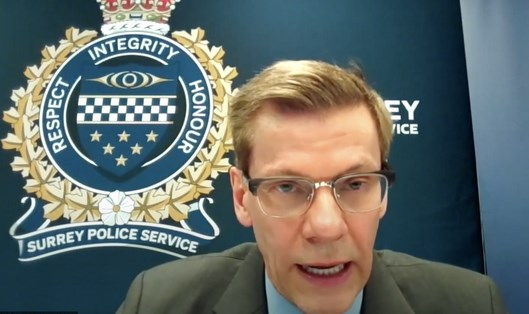Surrey’s incoming police chief Norm Lipinski stared down criticism of the city’s controversial police transition process Wednesday, pointing out how the RCMP has been slow to adapt to recommended changes, in stark contrast to how he expects his new municipal force to behave.
Asked at an online event by Surrey Board of Trade CEO Anita Huberman about a push by some residents (backed by the Mounties’ new union) to call a referendum on the police transition process before the end of the year, Lipinski defended the move in noting Surrey is the only large city in Canada without its own force. And, by establishing a local police board, the Surrey Police Service (SPS) will be able to adapt better to community needs.
Claiming to have a good relationship with the RCMP during the transition process, Lipinski nevertheless noted some of the federal force’s pitfalls.
He cited former Supreme Court Justice Michel Bastarache’s November 2020 report Broken Dreams Broken Lives that outlines failed attempts to reform the RCMP, which has been plagued by allegations of systemic racism and sexual misconduct. More recently, at the province’s public inquiry into money laundering, the RCMP has also been shown to have difficulty addressing financial crime.
“One of the things [Bastarache] did say was, since 2007, there’s been 12 reports on the RCMP about making it a better organization and his conclusion was they haven’t moved forward.
Whereas, “when the community wants something changed and the police board agrees with that, we change it instantly. We move forward in step with the community,” said Lipinski.
Lipinski’s briefing with the business group came the same day an informal petition launched to force the provincial government to set a local referendum. Opponents of the process say the transition is not transparent.
“From a legal perspective, the various levels of government have approved this.
“I do believe, long term, it is in the best interests of the citizens of Surrey,” said Lipinski.
The SPS has not presented a budget, to date, but Lipinski says that will come after community input, which launched Thursday with an information session.
He stressed how the process has had many legal corners to turn. There’s no indication what legal services alone are going to cost not just the City of Surrey, but senior governments, and whether those costs will be downloaded on the city.
“I’d say we’re midway through in terms of identifying the issues.
“There’s no template, there’s no rule book. We come across unknowns on a weekly basis,” said the chief.
Among new hires to date are Lipinski himself, three superintendents, 10 inspectors, seven staff sergeants and four sergeants. SPS also has a full-time lawyer in Kyle Friesen and communications staff.
What’s not clear is how much the SPS is planning to spend on parallel officers as the city continues to pay the full RCMP contract.
Lipinski says “boots on the ground” are coming by the end of the year in a staggered deployment that could take until the end of 2023, if not longer.
Other unknown costs include the IT system. Lipinski says that will cost about $21 million, up from an initial estimate of $7.5 million.
Lipinski intends to bring on community safety officers, who can conduct crime prevention programs.
The idea comes amid growing violent incidents involving organized crime groups.
Huberman asked if gangsters could be looking to take advantage of the clouded process to date.
“I haven’t heard any information of anyone watching this and trying to exploit the situation,” said Lipinski.
He has previously stated he is not concerned about a three-year hiring freeze on the Surrey RCMP, although on Wednesday he acknowledged the growth in Surrey and that “certainly with more people you’ll have more of a demand on policing.”
Lipinski also addressed officer recruitment and possible impacts on regional police detachments. He suggested others could need to augment their forces.
“I’m cognizant of not upsetting the ecosystem of recruiting and training in the Lower Mainland.”
However, he added, “I will not be hiring a lot of brand new recruits off the start. I’m going to look at getting experienced officers first so then we can recruit second. And so, therefore, that allows other police agencies, really, to overstaff if they feel they’re going to lose police officers to Surrey police.”
Huberman also asked about cybercrime and what Lipinski, who is Delta’s former deputy chief, sees as the trend moving forward.
“We do not have a very good lens of how much cybercrime is going on. We do know it’s on the rise.
“I do believe, in my view, there’s merit in cybercrime centres across the country.
The RCMP has a central cybercrime unit, or I’ll say, centre. We’ll see what the numbers are, we’ll see where the trends are. But there may be an argument to be made for a cybercrime centre in B.C., given the amount of transactions and the difficulty investigating them. So, you need subject experts and it’s a bit of a challenge if every police service in B.C. tried to develop their own subject matter experts — it’s just the economies of scale. It might make sense to have a cybercrime centre.”




